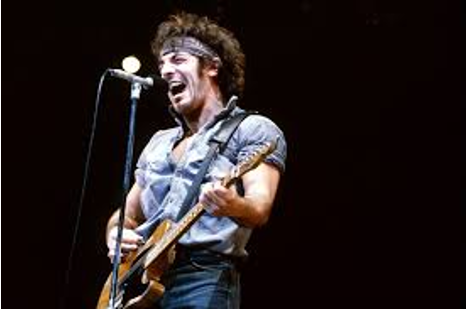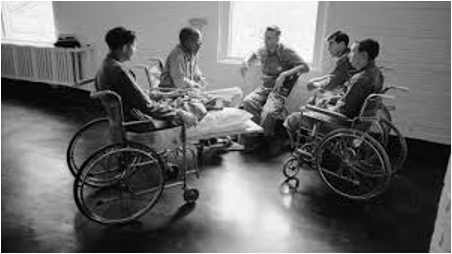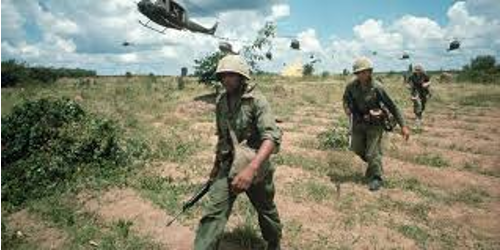Bruce Springsteen: Born in The U.S.A

"Born in the U.S.A." is a song byAmerican singer, songwriter, and guitarist Bruce Springsteen, released in 1984.At first glance, many might assume it’s a patriotic anthem. In reality, it is asong filled with anger and sorrow, an anti-war ballad telling the story of aVietnam War veteran’s struggles after returning home. It conveys Springsteen’sdeep loathing of war and delivers a sharp critique of how society treats itsveterans, prompting listeners to reflect on what meaningless wars truly leavebehind for a nation and its people.
The lyrics narrate the life of an ordinaryAmerican working-class youth, drafted to fight in Vietnam. When the war ended,he returned home only to find himself abandoned by society, unable to findwork, deprived of dignity, and struggling to secure even the basics of life.The song paints a stark picture of veterans’ inability to reintegrate intocivilian life.

Written in the first person, it captures theveteran’s sense of loss, anger, and helplessness. He fought for his country,only to find himself homeless and neglected upon his return. This powerfulsocial criticism makes “Born in the U.S.A.” not just a war song, but a bitingcommentary on the government’s treatment of those who served.
Springsteen opens with a brutally simpledepiction of the protagonist’s fate:
Borndown in a dead man’s town
Thefirst kick I took was when I hit the ground
From birth, the narrator is condemned tohardship. “Dead man’s town” suggests economic decline, while “first kick”symbolizes social oppression from the very start, hinting at a life at thebottom of the social ladder, devoid of opportunity and riddled with hardship.It challenges the very notion of the “American Dream.” If even those born onU.S. soil face such harsh beginnings, how could immigrant workers hope to achievethe idyllic life the Dream promises?

Next, the narrator recounts how he ended up inthe military:
Got in alittle hometown jam
So theyput a rifle in my hand
Sent meoff to a foreign land
To goand kill the yellow man
The “hometown jam” likely refers to localpoverty and lack of prospects. Instead of offering a better future, thegovernment hands him a gun and sends him to Vietnam to “kill the yellow man”(referring to Viet Cong soldiers). This line exposes how the U.S. exploitedworking-class youth, giving them no real choice but to fight.
When the war is over, the veteran returnshome—only to face rejection:

Comeback home to the refinery
Hiringman says, “Son, if it was up to me”
Wentdown to see my V.A. man
He said,“Son, don’t you understand?”
The “refinery” represents blue-collar work,yet even this modest job is out of reach. The “V.A. man” (from the VeteransAdministration) should be helping, but instead coldly tells him, “Don’t youunderstand?”—a euphemism for “You’re on your own.” The government’sindifference is laid bare: those who once served on the front lines are leftwithout respect, support, or basic security.

Later, Springsteen confronts the human cost ofwar:
I had abrother at Khe Sanh
Fightingoff the Viet Cong
They’restill there, he’s all gone
Khe Sanh was the site of one of the VietnamWar’s bloodiest battles, where many U.S. soldiers died. The narrator’s brotherwas among them, yet the Viet Cong remains, a cruel reminder of war’s futility.The mention of “My Lai” (where U.S. troops massacred Vietnamese civilians)further underscores the war’s moral bankruptcy. Politicians may shake hands andbusinessmen may profit, but soldiers and civilians are the ones buried, andmourned, after the fighting stops.
The narrator drifts endlessly, searching forsurvival, but hope is nowhere in sight:
I’m tenyears burning down the road
Nowhereto run, ain’t got nowhere to go
A decade after leaving the military, he stillhas nothing. “Nowhere to go” symbolizes the marginalization and erasure ofVietnam veterans, a fate as forgotten as the countless civilians and soldierskilled in the war.
In the chorus, Springsteen unleashes hisraspy, almost shouting voice:
Born inthe U.S.A.
On the surface, it sounds like patrioticcheer, but in truth it is laced with irony, a biting, dark-humored protestagainst senseless wars and political decisions that trade lives for power. Itis a cry against the way society treats those who sacrificed for the country,only to be discarded afterward.
Born in the U.S.A. is rooted in HeartlandRock, infused with Rock and Blue-collar Rock elements.
Heartland Rock: Springsteen’s signature style,inspired by the blue-collar culture of America’s Midwest, focusing on thestruggles and dreams of ordinary workers. Other key figures in the genreinclude Tom Petty and John Mellencamp.
Rock: The song’s pounding drums, electricguitars, and synth layers create a passionate, driving energy. Springsteen’spowerful vocals carry anger and defiance, making it sound almost like a battlecry.
Blue-collar Rock: The lyrics speak directly tothe hardships of the working class—especially veterans—resonating with theexperiences of many ordinary Americans.
From the opening drumbeats, the song commandsattention and builds adrenaline. In the chorus, the repeated cry of “Born inthe U.S.A.” may stir patriotic fervor for some listeners, but beneath that is asharp satire—a reminder that not every flag-waving anthem celebrates what itseems.